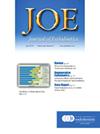Efficacy of Different Irrigation Needles and Ultrasonic Activation on Calcium Hydroxide Removal: A Micro-CT Study Using 3D-Printed Endodontic Models
IF 3.5
2区 医学
Q1 DENTISTRY, ORAL SURGERY & MEDICINE
引用次数: 0
Abstract
Introduction
The aim of this study was to evaluate the efficacy of different irrigation needles and passive ultrasonic activation in removing Ca(OH)2 from an endodontic model that duplicated a root canal configuration of a human natural tooth.
Methods
An extracted human maxillary premolar was subjected to root canal preparation and scanned with microcomputed tomography. A 3-dimensional reconstruction model of the natural tooth was printed to endodontic models using a polyjet printer. The root canals of the models were filled with Ca(OH)2 paste and divided into 2 groups based on the irrigation protocol: conventional syringe-needle irrigation (conventional group) and passive ultrasonic irrigation (PUI) group. Each group was subdivided into 3 groups (n = 10) according to the type of needle: half-cut, side-vented, and TruNatomy irrigation needle. Microcomputed tomographyimaging was used to assess the percentage of reduction of Ca(OH)2. Data were analyzed using two-way analysis of variance test (α = .05).
Results
The side-vented and TruNatomy irrigation needles showed significantly higher percentage reductions than the half-cut needle (P < .05) in the conventional irrigation group. The PUI group showed significantly higher percentage reductions of Ca(OH)2 than the conventional group regardless of the type of needle (P < .05). However, no significant difference was found among the needles in the PUI group.
Conclusions
The type of irrigation needle and the use of PUI influenced the removal efficacy of Ca(OH)2. PUI enhanced the removal of Ca(OH)2 regardless of the type of irrigation needle.
不同灌洗针和超声波激活对氢氧化钙清除的功效:使用 3D 打印牙髓模型进行的显微 CT 研究。
简介:本研究的目的是评估不同灌洗针和被动超声波激活在清除复制人类天然牙根管结构的牙髓模型中的 Ca(OH)2 的功效:方法: 对一颗拔出的人类上颌前磨牙进行根管预备,并用微型计算机断层扫描(micro-CT)进行扫描。使用 polyjet 打印机将天然牙的三维重建模型打印成牙髓模型。用 Ca(OH)2 糊剂填充模型的根管,并根据灌洗方案分为两组:常规注射器-针灌洗组(常规组)和被动超声波灌洗组(PUI 组)。每组又根据灌洗针的类型分为三组(n = 10):半截式、侧通式和 TruNatomy 灌洗针。显微 CT 成像用于评估 Ca(OH)2 减少的百分比。数据分析采用双向方差分析检验(α = .05):结果:在传统灌流组中,侧向进针和 TruNatomy 灌流针的减少百分比明显高于半截针(P < .05)。无论使用哪种针,PUI 组的 Ca(OH)2 减少百分比均明显高于常规组(P < .05)。然而,PUI 组不同针头之间没有发现明显差异:结论:灌洗针的类型和 PUI 的使用影响了 Ca(OH)2 的去除效果。无论灌洗针的类型如何,PUI 都能提高 Ca(OH)2 的去除率。
本文章由计算机程序翻译,如有差异,请以英文原文为准。
求助全文
约1分钟内获得全文
求助全文
来源期刊

Journal of endodontics
医学-牙科与口腔外科
CiteScore
8.80
自引率
9.50%
发文量
224
审稿时长
42 days
期刊介绍:
The Journal of Endodontics, the official journal of the American Association of Endodontists, publishes scientific articles, case reports and comparison studies evaluating materials and methods of pulp conservation and endodontic treatment. Endodontists and general dentists can learn about new concepts in root canal treatment and the latest advances in techniques and instrumentation in the one journal that helps them keep pace with rapid changes in this field.
 求助内容:
求助内容: 应助结果提醒方式:
应助结果提醒方式:


